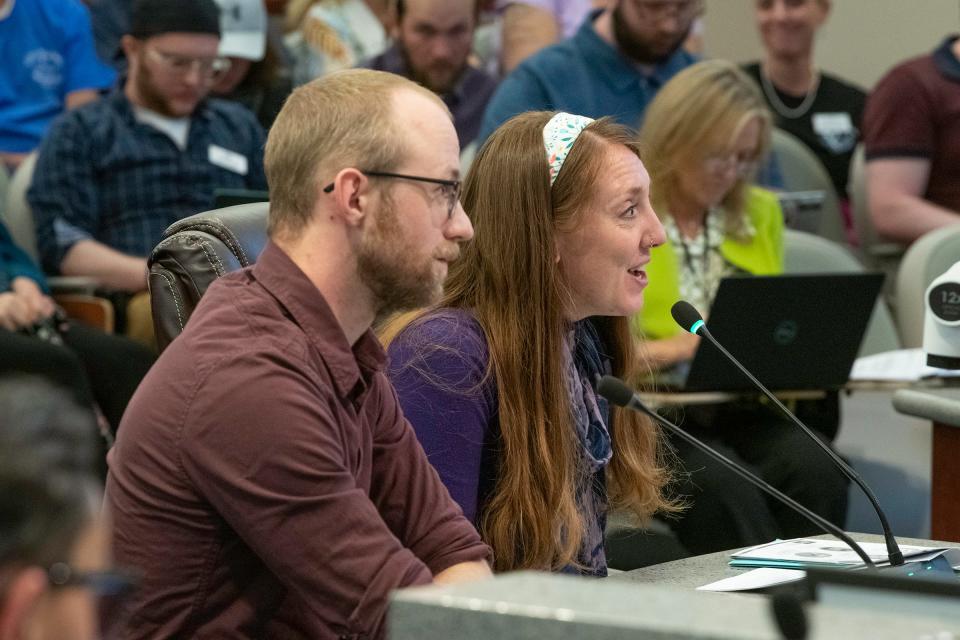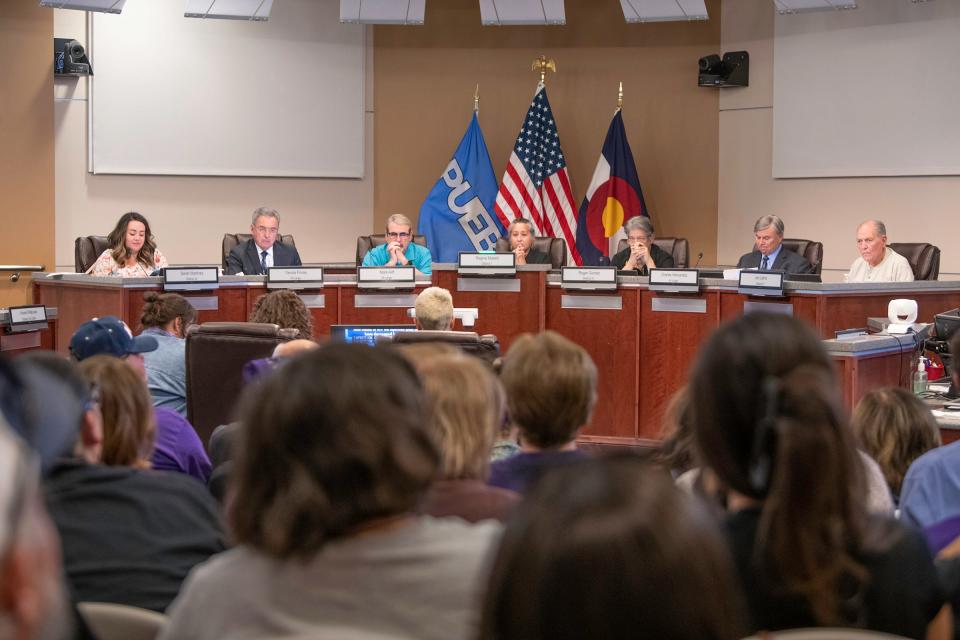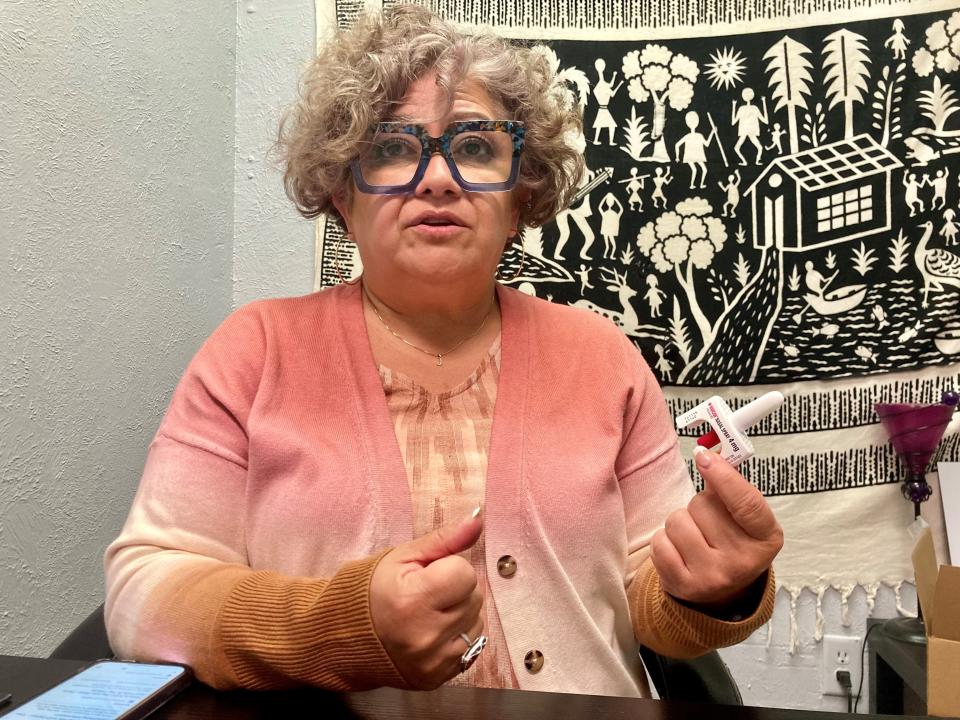What Puebloans had to say about city council's ban on needle exchanges
Pueblo City Council chambers were filled Monday night with supporters of Pueblo's two syringe access programs, who provided evidence about the programs' efficacy and delivered heartfelt testimony urging city council to vote against banning syringe access programs in Pueblo.
A total of 44 people spoke against the ban at the meeting, while just six people said they supported it.
Despite the testimony and support for the programs, city council ultimately adopted the resolution banning syringe access programs in a 5-2 vote, with councilors Dennis Flores and Sarah Martinez voting against it.
Pueblo has two syringe access programs: the Southern Colorado Harm Reduction Association and Access Point Pueblo.

Arguments against the ban
During a council work session, Alexandra Kellogg, a member of Project Apollo Street Medicine and a family health physician in Pueblo, testified that syringe access programs, also referred to as needle exchange programs, work to improve health outcomes, reduce the spread of infectious diseases, and promote public safety.
Kellogg detailed several stories from her previous experience working in Appalachia in a town without a syringe access program, including one patient who was left brain dead after using a dirty needle, leaving behind a woman 13 weeks pregnant with his child. Another individual was left with permanent scars after a long ICU stay, during which they needed to be intubated after unknowingly sharing an HIV-infected needle.
Council heard over two hours of testimony from those against the ban, including doctors, counselors, owners of local businesses and nonprofits, veterans, church leaders, and a few people who recovered from addiction with the help of syringe access programs.
Emily Gradisar, a co-owner of Ethos Pueblo, a community arts and entertainment space that features Pueblo's only alcohol-free bar, argued that city council has not yet provided any concrete solutions to address the problem.
"One of the two (syringe disposal) kiosks in town is outside Ethos, emptied regularly by a medical disposal company. And wouldn't you know, since its installation, I haven't found a single sharp nearby," Gradisar said. "By allowing this box to be installed, we've reduced needle waste by far more than this council."
Gradisar stated before the vote that if council bans Pueblo needle exchanges, that kiosk will go away. She asked council members which of them would be outside her business picking up the resulting syringe litter.
Gradisar also pointed out that the needle exchange programs dispose of syringes for free and if you call police to report a discarded needle, they give out Access Point Pueblo's number. She asked who council intends to hand that duty off to.
During the meeting, Kristine Archuleta told council that 17 months ago, she walked into the Southern Colorado Harm Reduction Association "broken and at the end of her rope," desperate not to lose the war with addiction she had been fighting most of her life.
Archuleta described being met with warm smiles and staff that sat with her and assured her she "no longer had to fight alone," and who were quickly able to place her and her daughter in a living situation.
Through SCHRA, she said she was able to rebuild her and her daughter's lives, and her daughter gained back the ability to just be a kid. "With hard work and continued support, I've been able to get an apartment and two full-time jobs ... we do recover, and without an exchange program, I'd have never walked into SCHRA."
"I leave you with a question from my 10-year-old daughter — she asked me, "Mommy, if they close the needle exchange, what happens to all the kids with mommies that still need help? Who is going to help them like they helped us?"
Traemon McCabe, a licensed counselor, stated that "tough love" was not a viable solution to treat addiction, and that people do not purposely seek to be addicted. McCabe stated that in his experience working with people living with addiction day in and day out, people dealing with substance use disorder are running from pain and trauma. He said that during his work with drug courts, probation and law enforcement officers, he has seen that syringe access programs increase the probability that someone will have long-term recovery.

Arguments for the ban
While the overwhelming majority of people in attendance spoke against the ban, Sam Hernandez, who ran for mayor as a Conservative candidate last election cycle, spoke in favor of banning syringe access programs, citing a concern that the programs are not an exact exchange. However, Hernandez told the Chieftain that he would be in favor of the programs if they could prove that they were exchanging syringes at a one-for-one rate.
Puebloan Luke Wodiuk argued that the programs enable drug use like "telling people don't smoke, but there's a pack of cigarettes right there." Wodiuk argued that people in jail do not get syringes "because they're illegal."
When reached by the Pueblo Chieftain Tuesday morning, Tenth Judicial District Attorney Jeff Chostner said he "fully supports" the ban.
“In my view, it has not successfully or sufficiently addressed the various problems noted in Council’s discussion of the matter," Chostner said. "In my view, it has made Pueblo somewhat of a magnet to individuals looking for what they perceive as “legal” use of needles to facilitate illegal drug use. In terms of used needles being found in various parts of the community, I don’t believe the program has sufficiently abated that problem."
Chostner said it's his belief that "there are other ways to confront and address illegal drug use without the dispensing of syringes to an addicted population.”

Harm reduction experts react
Christine Charron, prevention services manager for Access Point Pueblo, told the Chieftain immediately after the vote that the organization would still be open on Tuesday to "provide that critical effort to the community," although she said she was unsure what the syringe access portion of its services would look like.
"I think we're all not surprised — the testimony, and Counselor Sarah Martinez's comments, really brought to light the lack of transparency on the council's solutions for the issues we made very clear with this ban passing, as well as lack of transparency around the constituents they keep referencing," Charron said. "We've yet to have a single business that has told them council members have referenced them to call us for syringe litter."
Jude Solano, CEO of SCHRA, said she fully intends to obtain legal representation and fight back.
"I can't divulge too much, but we're definitely looking into the legality of the ordinance," she said. "The ordinance is very broad and generalized. They are saying that the syringes are the cause of drug use in the community. Would that include home health care, blood providers, the street outreaches that give people needles for their medicine, insulin, things like that? It's just too broad, there's no definition."
SCHRA also intends to gather signatures to submit a referendum on the issue, stating, as demonstrated by Monday night's outpouring of support for the two programs, that "there's plenty of support for that."
Both of Pueblo's syringe access programs, as well as several individuals who spoke to the Chieftain after the decision, echoed that they felt council was not listening to their community.
"It is obvious that the majority that voted for the bans do not care about their constituents, and do not care about this community," Solano said.
Kellogg told the Chieftain she was proud of everyone who came to support the two programs, and that she was grateful for Martinez and Flores, the councilors who voted against the ban.
However, she said that "the majority of our city council members make it clear that they are focused only on representing the affluent part of our community, and will do everything in their power to prosecute their despondent and suffering constituents."
She said she was "saddened that (council members) are unable to distinguish true scientific facts from unfounded claims," and were "unable to lead with compassion."
A spokesperson for the city of Pueblo stated Mayor Heather Graham was unavailable for comment Tuesday.
Questions, comments, or story tips? Contact Justin at Jreutterma@gannett.com. Follow him on X, formerly known as Twitter, @jayreutter1.
This article originally appeared on The Pueblo Chieftain: Pueblo residents react to city council banning needle exchanges

